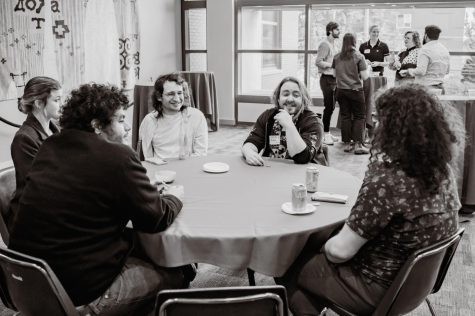Lavender Graduation Celebrates Queer Students
The Non-Binary, Gender Non-Conforming and Allies Student Association (NGNCA) collaborated with the OutLaws organization to host the annual Lavender Graduation for queer students. The celebration took place April 13 and is a long-standing tradition within the LGBTQ+ community, seeking to create community spaces to celebrate achievements together and foster visibility. This year, the event was kept more casual so that students could pop in at any time to grab a cord and relax with their peers.
Sophia Anderson, a second-year law student, appreciated the Lavender Graduation as a space in which they could feel secure in both their identity and field of study.
“I think creating a space to specifically celebrate queer identity in the law is so important to show people who aren’t graduating yet that there is a place for us. That we are going to be successful and we are going to move forward with power and strength,” Anderson said.
The LGBTQ+ community is underrepresented in many fields of academia, particularly STEM. To have an event that specifically celebrates queer students that have worked hard through their studies while navigating academia is valuable for those who do not have the same support systems as other students.
Jay Conrad, a third-year law student and president of NGNCA, is closely involved with queer advocacy on campus and values the importance of creating spaces where queer people can be celebrated.
“A ceremony like this is a reclamation of space that has been traditionally denied to us. It’s us saying ‘we’re here, and we’re succeeding at this from a space where we’ve been historically excluded,’” Conrad said.

Conrad also feels an urgency to use the skill set they’ve developed to support their community.
When the NGNCA was founded by Conrad, the main reason was to advocate for policy changes such as normalizing the use of preferred pronouns and roster name changes. Seattle U’s imperfect but generally sustained culture shift toward more inclusive language was the result of student organizing by groups including NGNCA.
Anderson talked about how their experience with being publicly out in law school has not personally impacted them in hiring processes with interviewers but that some of the questions they face about their identity have put them in an uncomfortable position.
“It does feel like I’m stepping into the role of educator when we should be immediately accepted. It creates a strange dynamic when we’re educating our bosses about ourselves,” Anderson said.
Anderson feels that allies should go out of their way to educate themselves and promote learning about underrepresented communities to others so that queer people do not have the sole responsibility of educating their fellow students and coworkers.
Events like the Lavender Graduation create spaces in which students can be themselves, but there are additional efforts that some students are pushing for. Jasper Mathews, a first-year creative writing major, expressed that they would like to see advocacy continue at both the student and administrative levels at Seattle U.
“Celebrations like the Lavender Graduation are important maintenance of queer spaces outside of heteronormativity. However, on its own is not enough,” Mathews said. “It is comforting to me to see efforts made to foster a supportive community and celebrate minorities, but queerness is not yet celebrated in both private queer spaces and public spaces. There is still more progress to be made.”


